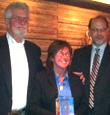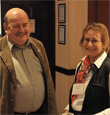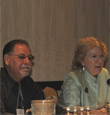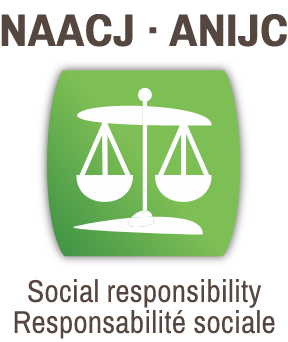Publications
Historical and other documents
2022 Presentation: About NAACJ
2020 Project Report: Individuals with a Criminal Record and Volunteering
2019 Criminal Records and Volunteering: A Brief Scan of the Literature as it Relates to Social Inclusion
2008 What Everyone Should Know About Canadian Criminal Justice
2007 NAACJ Press Release: National Agencies Question Efficacy of Review Recommendations
1990 Discussion Paper: Making Justice Real: Social Responsibility in Criminal Justice
1988 NAACJ Seminar: Reducing the Harm of Drug Use: Legalization and Other Issues
1987 Workshop Proceedings: New Directions in Criminal Justice
1984 NAACJ Seminar: Correctional Law Review
1984 NAACJ Seminar: The Young Offenders Act
1984 NAACJ Study Session: Victims of Crime
1983 NAACJ Consultation on Sentencing Report
1982 NAACJ Seminar Report: Native People and the Criminal Justice System
1980 NAACJ Workshop Notes: Role of the Voluntary Sector in Criminal Justice
- Read the Church Council on Justice and Corrections' e-newsletter, The Well, by clicking here. In it you will find ongoing dialogue on the issues of general concern regarding our justice system, research and activities of CCJC and updates on the evolving issues of restorative justice.
The Church Council on Justice and Corrections has an interactive Restorative Justice Quilt that is available to groups for touring. Each square when touched activates the story of the victim or offender who created it. It can be a meaningful addition for your events. - Victims Pastoral Care is of great concern for CCJC and we hold a victims centered event each year meant to promote healing, celebrate resilience, and provide a forum where victims can be heard.
- CoSA (Circles of Support and Accountability) is a program CCJC supports in its work with high risk offenders reentering the community. Surrounded by Circles of volunteer support for guidance, social connection and accountability, this program's success is evident with research results indicating that recidivism is 80% less if individuals have the availability of these groups when they leave incarceration.
- Working Together for Canadian Justice: The Showcase Site is a a web-based forum to improve communications about criminal justice issues. The on-line community allows organizations concerned about and contributing to the development of criminal justice policy in Canada to maintain close contact regarding a variety of pertinent issues.
- The Collaborative Justice Program (CJP) was established to assist youth offenders and those affected by crime through a restorative justice option. CJP staff facilitate direct or indirect communication between the accused, their parent(s), the victim(s), and community members. The CJP recently launched into independent status after 10 years of its creation by the Church Council on Justice and Corrections.
- Looking to volunteer? NAACJ has opportunities and suggestions. Check out our online application form or contact us for more information!
- The Canadian Friends Service Committee (CFSC) website provides information on our work and history. Check it out at quakerservice.ca!
CFSC offers community based grants to those doing justice work related to our Quaker mandate. Information and applications can be found here. - John Howard Society celebrating: The John Howard Society of Canada celebrates its 50th year of service in 2012 and The John Howard Society of Ottawa celebrates its 60th Anniversary this year as well.
- Read about the Mennonite Central Committee Canada's work in Ontario to promote Restorative Justice at http://ontario.mcc.org/restorative.
- Learn about Restorative Justice Ministries through the Alberta Mennonite Central Committee of Canada here http://alberta.mcc.org/programs/rjm. The Mennonite Central Committee of Canada offers information, resources and stories about Restorative Justice here http://ottawa.mcc.org/whatwedo/restorative-justice.
- In August 2011, the Canadian Bar Association passed several resolutions urging federal, provincial and territorial governments action on these issues, among others (PDF files):
- Action to End Homophobic and Transphobic Bullying
- Mentally Ill Persons in the Criminal Justice System
- Justice in Sentencing
- Response to Elder Abuse
- Justice Resources
- Preserving Special Consideration for Aboriginal Persons in the Criminal Justice System - Since 1989, ASRSQ has produced a bulletin, Porte ouverte which can be found here (french content) and also has some english articles
- In collaboration with community-based employment and employability organizations active in Québec, ASRSQ set up a website providing relevant information regarding the impacts of criminal records, which is available here www.casierjudiciaire.ca.
- Did you know? L'Association des services de réhabilitation sociale du Québec (ASRSQ) provides training for staff and volunteers of its member organizations each year. Over 25 training sessions are held each year involving over 100 staff or volunteers.
- The Seventh Step Society of Canada received a small grant from Public Safety Canada's Policy Development Contribution Program to recruit, train and develop volunteers in the Pacific Region to deliver the 7th Step Program, in the community and in the institutions. The Society is getting started in the Abbotsford region with hopes to expand to the greater Vancouver area. There is one active 7th Step self-help group going in to Matsqui Institution at present. Check out the new Seventh Step Society of Canada website: www.7thstep.ca
- Learn about the St. Leonard's Society of Canada at www.stleonards.ca or browse their newsletter, Community Connections.
- As the largest non-governmental direct provider of social services in Canada, The Salvation Army provides unprecedented support to society's most vulnerable. With the public's generosity, in 2010 in Canada:
- The Salvation Army provided 6,350 shelter, addictions, detox and mental health beds for vulnerable men, women and families in Canada.
- The Salvation Army served 2.7 million meals.
- The Salvation Army assisted 1,152,700 persons with food, clothing or practical assistance. - Read the Canadian Association of Elizabeth Fry Societies fact sheets about:
- Aboriginal Women
- Community Options Required
- Criminalized & Imprisoned Women
- Deaths in Custody
- Health & Mental Health
- Human and Fiscal Costs of Prison
- Issues Associated with Increased Criminalization of Women
- Long Term Effects of Abuse and Trauma
- Mandatory Minimum Sentences - A Solution Looking for a Problem
- Mothers in Prison
- Poverty
- Violence Against Women and Children
- Young Women - The Canadian Criminal Justice Association publishes contents and some abstracts online from the Canadian Journal of Criminology and Criminal Justice at http://www.ccja-acjp.ca/en/cjc.html.
- The Canadian Families and Corrections Network has made this resource available online for family-victims: One Step at a Time - Reshaping life following crime within the family.
CFCN’s 2007 research paper Incarcerated fathers: A descriptive analysis studied a sample of incarcerated fathers in Canadian federal correctional institutions. The research data indicated that “children of federally sentenced fathers are 2 to 4 times more likely to be in conflict with the law than Canadian children in general.” - The Canadian Training Institute provides more than just training! CTI has published numerous training manuals including:
- A Primer on Residential Services: From a Criminal Justice Perspective,
- A Primer on Community Corrections and Criminal Justice Work in Canada,
- Youth Justice In Canada: A Resource Manual,
- A Literature Review on Youth Violence: From Risk to Resiliency utilizing a Developmental Perspective,
- An Annotated Bibliography of Residential Facility Siting Studies, and
- A Community Impact Study: the effect of locating Community Correctional Residences on property values, on crime rates and public attitudes. - Check outCorrections and Conditional Release in Canada - A General Primer (2010)
- Kim Pate (center) receives the Office of
 the Correctional Investigator's Ed McIsaac Human Rights in Corrections Award(2011) from Howard Sapers (right) and Ed McIsaac.
the Correctional Investigator's Ed McIsaac Human Rights in Corrections Award(2011) from Howard Sapers (right) and Ed McIsaac. - NAACJ's Strategic Success Process : With the generous support of Public Safety Canada, NAACJ was able to engage professional consultants from One World Inc., Tim Fleming and Sybil Frei, to help design, develop, facilitate and implement an energizing strategic review process aimed at clarifying our roles and improving relationships.
Based on the SOAR approach (strengths, opportunities, aspirations and results), the process included face-to-face engagement sessions, a partnership workshop, teleconferences, advisory group meetings as well as both internal and external interviews with NAACJ members, staff and key partners.
Members developed a vision statement and identified three priority areas, which will serve to guide our operations to 2014.
Wrapping up at the end of 2010-2011, the process and plan identifies initiatives to raise awareness about NAACJ and its member organizations on a regular basis. We look forward to working more effectively on matters of mutual concern with our partners in order to improve our contributions to criminal and social justice across sectors.
Read more about our Strategic Directions here. - Community Empowerment through Social Enterprise : The annual joint policy workshop with the Departments of Public Safety and Justice in
 February 2011 was another resounding success. Community Empowerment through Social Enterprise brought together leading national experts like David LePage with international keynote speaker from the Safer Foundation, Diane Williams. Said to be the most successful joint NAACJ/PS/DOJ event in recent memory, it was reported to be responsible for encouraging the development of 12 social enterprise projects among communities and Public Safety Canada. Read the report here.
February 2011 was another resounding success. Community Empowerment through Social Enterprise brought together leading national experts like David LePage with international keynote speaker from the Safer Foundation, Diane Williams. Said to be the most successful joint NAACJ/PS/DOJ event in recent memory, it was reported to be responsible for encouraging the development of 12 social enterprise projects among communities and Public Safety Canada. Read the report here. - It is the 20th Anniversary of the Corrections and Conditional Release Act in 2012. The CCRA was proclaimed into force on November 1, 1992.
- Click here to download CCJC's 2011 CoSA Gathering Report.
- Families and Corrections Journal Vol 15 No 1 (Spring 2012)'s is a must-read (PDF file). It includes a research report Family-based reintegration, as well as two articles: Volunteers and the circle of support, and Face to face with intergenerational crime.
- While the emphasis of each group's work may be different, NAACJ has developed an overarching vision of a socially responsible approach to justice that values research as the basis for sound social policy and supports equality and the Canadian Charter of Rights and Freedoms.
NAACJ enables and supports members to learn, energize and gain strength through meaningful dialogue with each other and with others in the criminal and social justice field. By doing so, NAACJ bolsters its members' ability to serve as catalysts for change relating to their missions of effective justice responses that uphold and promote human rights.
NAACJ's strength lies both in its diversity and its unity.
- Commissioner of Corrections Don Head (left)
 meets with NAACJ members at the Annual General Meeting in Cornwall, ON, September 2011.
meets with NAACJ members at the Annual General Meeting in Cornwall, ON, September 2011.  Patrick Altimas, ASRSQ, and Elizabeth White, SLSC
Patrick Altimas, ASRSQ, and Elizabeth White, SLSC  Allen Benson, NCSA, and Mary Campbell, Public Safety Canada
Allen Benson, NCSA, and Mary Campbell, Public Safety Canada - ON APRIL 11, 2012 THE AWARD WINNING, INTERNATIONALLY RENOWNED SERVICE KNOWN AS LIFELINE, PROVIDING IN-REACH PROGRAMMING TO LIFE SENTENCED PRISONERS, WAS CUT BY GOVERNMENT. For more than 20 years, life sentenced men and women who have proven their ability to reintegrate successfully have offered support, friendship and counselling to men and women serving long term and life sentences. They have offered hope ...that there can be "life after Life".
This is a huge loss to effective corrections, and the cuts will affect many hard working and dedicated staff who have committed their time to helping some of the most vulnerable people within Canada's federal institutions. The St. Leonard's Society of Canada will continue to bring updates on how we can continue to serve those in need and how we might move forward with the spirit of LifeLine. - The Restorative Justice Division of the Correctional Service of Canada (CSC) is accepting nominations until July 12 2012 for the 2012 National Ron Wiebe Restorative Justice Award. The award is open to all Canadians who model restorative justice principles in the service of justice and peace. Please feel free to share this Call for Nominations to criminal or social justice agencies, faith groups, schools, local neighbourhood coalitions, and other communities in your network.
- Congratulations to NAACJ member Kim Pate, who received an Honourary Doctorate from the University of Ottawa on June 3 2012.
- The Mental Health Commission of Canada made history on May 8 2012 with the official launch of the first-ever Mental Health Strategy for Canada, a blueprint for improving the mental health system. Learn more here.
- The choir at Pittsburgh Institution near Kingston Ontario recently recorded a song with local music producer Chris Brown, to encourage donations to the Kingston Community Songbook project. The Canadian Broadcasting Corporation (CBC) interviewed Chris Brown on the radio program As it Happens on June 7 2012. Listen to the last 15 minutes of part 3 "KINGSTON PRISON MUSIC" here: http://www.cbc.ca/asithappens/
